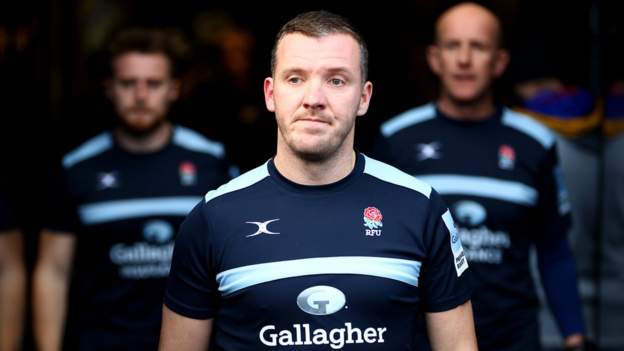
Tom Foley is well aware how some people think rugby referees fill their time between matches.
"There is a perception you just turn up on a Saturday, then spend the rest of the week watching TV," he says.
The truth, of course, is rather different.
For as players are fine-tuning their set-pieces, line-out calls and attacking plays, the officials are also putting in the hours to make sure they are ready to perform at their best in high-pressure situations.
Foley has been a full-time referee in rugby union's Premiership since 2014. His first top-flight match as the man in the middle was between London Welsh and Wasps, and he has gone on to referee more than 100 games in the competition, as well as being a television match official on the international stage.
Here he talks us through what a week in the life of a Premiership referee looks like.
Monday: Recovery and review
The first day of a new week is spent at Rugby Football Union headquarters.
The morning features a recovery session led by a strength and conditioning coach, with each referee having an individual programme. After lunch, referees take part in a review of the weekend fixtures.
Foley says: "We sit down with a performance reviewer - there will be one dedicated to each game. You review the game and look at every time you blew the whistle to see if it was correct, and will also look if there were times you should have blown the whistle but didn't.
"We look at every scrum and line-out, get a gauge of how the game has been and also focus on the big moments.
"We build a picture of the game before feeding back to the rest of the group. If I have done something and the group agree that is how we want to referee going forward, we will then make sure we do it next week.
"It is quite involved, and there is a lot of rugby."
Tuesdays: Fitness and more review
Tuesday mornings involve high-intensity fitness - the most feared session of the week.
Foley says: "Mondays aren't usually too bad in terms of conditioning. Tuesdays are the killer - involving interval training and a lot of running, with some weight training too.
"In the afternoon, we might have an external speaker in to focus on if we are seeing a trend in matches. We will spend a couple of hours discussing what we are seeing and how we are seeing it as a group.
"That will all be fed to the clubs so they will know what to expect from us. It is a pretty full couple of days."
Wednesday: A day away
After two intense days, this is the opportunity to take a day outside of rugby. However many referees use it as an opportunity to work with clubs in support sessions - officiating at training sessions.
Doing so helps Foley and his colleagues develop the things they have focused on in review sessions but also offers them the chance to talk to players about their expectations during matches. The end goal is to improve the flow of the weekend's games.
Thursday/Friday: Team preparation
This is time to really focus on the next round of matches. Officials will often have weekend double-headers - perhaps refereeing on a Saturday, then being the TMO or assistant referee on the Sunday. With that comes two different things to prepare for.
Foley says: "Once the teams are announced, you are looking at how they have played before. Not to see if they have been cheating or trying to push the laws, but it is important to understand how they play.
"If they play a lot of ball off the top of the line-out, it might affect my positioning so I don't get in the way. Or if they are looking to compete a lot at the breakdown, it might be painting a real picture in my mind about how I want to see that as well.
"We will speak to our assistant referees and TMOs during the week as well to try and make sure we are all on the same page. That has been made clearer this year as we are all in pods, so you are working with the same people week in, week out.
"That means you don't have to start from scratch each week, building up relationships. You are topping up that knowledge throughout the week before you go again at the weekend."
Saturday/Sunday: Matchday
The final task of the week is to put all of the preparation into practice on matchday.
"You're in a pressured situation in a game and you want your mates to help you out," says Foley.
"There is a genuine feeling that we can make the whole officiating appear better if we are all working together."
Once the weekend is done, the process starts all over again. A week in front of the TV it is not.















 Phone: (800) 737. 6040
Phone: (800) 737. 6040 Fax: (800) 825 5558
Fax: (800) 825 5558 Website:
Website:  Email:
Email: 






